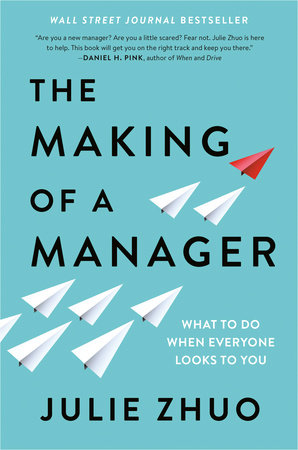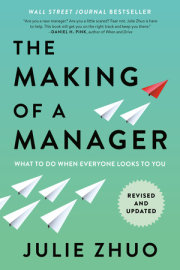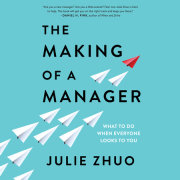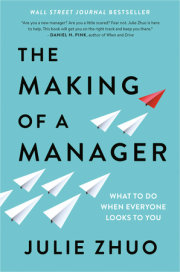IntroductionGreat Managers Are Made, Not BornI remember the meeting when my manager asked me to become a manager.
It was unexpected, like going for your daily run and tripping over a pirate chest.
Oh, I thought,
how intriguing.
We were sitting in a ten-person conference room, kitty-corner from each other. “Our team is growing,” my manager explained. “We need another manager, and you get along with everyone. What do you think?”
I was twenty-five, working at a start-up. All that I knew of management could be neatly summarized into two words,
meetings and PROMOTION. I mean, this was a promotion, wasn’t it? Everyone knows this conversation was the equivalent of Harry Potter getting a visit from Hagrid on a dark and stormy night, the first step in an adventurous and fulfilling career. I wasn’t about to turn down that kind of invitation.
So I said yes.
It was only later, walking out of the room, that I thought about the details of what she had said.
I got along with everyone. Surely there was more to management than that. How much more? I was about to find out.
—
I remember my first meeting with a direct report.
I arrived five minutes past our scheduled time, in a rush and flustered by my lateness.
This is a terrible start, I thought to myself. I could see him through the windowed door of the conference room—the same one I had met my manager in previously—eyes glued to his phone. Just a day earlier, we had both been designers on the same team, sitting in our adjacent pods, working on our respective projects while lobbing rapid-fire design feedback across the aisle. Then the announcement was made, and now I was his manager.
I’m not nervous, I told myself.
We’re going to have a great conversation. About what, I wasn’t entirely sure. I just wanted this meeting to feel normal, like it had yesterday and the day before that. If he didn’t love the fact that I was his manager, then at the very least I wanted him to be cool with it.
I’m not nervous.
I walked in. He glanced up from his phone, and I’ll never forget the expression on his face. It had all the surliness of a teenager forced to attend his ten-year-old cousin’s Pokémon-themed birthday party.
“Hi,” I said, trying to keep my voice level. “So, uh, what are you working on right now?”
His scowl only deepened, settling in like a bear for the winter. I could feel the sweat starting to form on my face, the hot rush of blood pounding in my ears.
I wasn’t a better designer than this guy. I wasn’t smarter or more experienced. The look on his face alone was enough to dispel me of any notion that he’d “be cool” with the fact that I was his manager. The message was as clear as if it had been written in giant black Sharpie:
You have no idea what you’re doing.
At that moment, I felt he was absolutely right.
—
Three years later, after that fateful conversation with my manager, my role shifted again. Our design team had almost doubled in size since I started. Having made it through my first few years at a hyper-growth start-up, I thought I was used to change. I was no stranger to dealing with the firsts or rolling with the punches.
Still, I was unprepared for just how much the new manager role would stretch me. For one thing, I was managing product designers, a discipline I didn’t even know existed before I arrived at the company. For another, the responsibilities of managing people and the way they worked together felt like an enormous leap from creating user interfaces or writing code. In those early months and years, everything felt new and uncomfortable.
I remember my first time interviewing someone for my team. Even though I was clearly the one with the upper hand—
I asked the questions,
I decided how the conversation should flow,
I selected
hire or
no hire at the end of the day—my hands were shaking for the entire forty-five minutes. What if the candidate thought my questions were stupid? What if she saw me for the fraud I felt like? What if I accidentally made our team seem like a clown show?
I remember my first time delivering bad news. We were kicking off an exciting new project that had everyone passionately discussing the possibilities. Two of my reports asked me if they could be the lead. I had to say no to someone. I practiced the conversation in front of my bathroom mirror at home, imagining every terrible scenario—was this even the right decision? Was I a dream crusher? Would somebody quit on me right on the spot?
I remember my first time presenting in front of a large audience. I was showcasing design work at Facebook’s F8 conference amid a sea of fuzzy cushions and neon lights. We’d never done a public event at that scale before, so it was a big deal. In the weeks leading up to the event, I couldn’t stop fiddling with every detail of my presentation. I desperately wanted it to go well, but public speaking terrified me. Even practicing my talk in front of helpful colleagues felt like a nerve-racking ordeal.
I remember my three primary emotions navigating the choppy waters of my new role: fear, doubt, and
am I crazy for feeling this way? Everyone else around me seemed to be doing just fine. Everyone else made it look easy.
I never thought managing was easy. I still don’t.
Today, nearly ten years after I started on that path, my team has grown by a few orders of magnitude. We design the experience that more than two billion people see when they tap the blue
f icon on their phones. We think through the details of how people share what’s on their minds, keep up with their friends, interact through conversations and thumbs-ups, and create communities together. If we do our jobs well, then people all over the world—from Belgium to Kenya, from India to Argentina—will feel closer to one another.
Good design at its core is about understanding people and their needs in order to create the best possible tools for them. I’m drawn to design for a lot of the same reasons that I’m drawn to management—it feels like a deeply human endeavor to empower others.
I’m by no means a management expert. I’ve learned largely by doing, and despite my best intentions, I’ve made countless mistakes. But this is how anything in life goes: You try something. You figure out what worked and what didn’t. You file away lessons for the future. And then you get better. Rinse, repeat.
I’ve had plenty of help, too, in the form of some amazing leadership training courses (Crucial Conversations is my favorite), articles and books that I turn to again and again (like
High Output Management and
How to Win Friends and Influence People), and, most important of all, my colleagues. They have generously shared their wisdom with me and inspired me to strive for better. I feel lucky to have worked with Mark Zuckerberg, Sheryl Sandberg, and a host of others past and present who have taught me so much.
Another tactic in my self-education started about four years ago, when I decided to write a blog. I thought that the act of sitting down every week and sorting through the jumble of thoughts ping-ponging around my head would help me make sense of them.
I called my blog
The Year of the Looking Glass because, like Alice, “I know who I
was when I got up this morning, but I think I must have been changed several times since then.” One day, far in the future, I imagined looking back on my collection of posts and recalling my journey. Here were all the things I struggled with.
Here are all the ways I have learned.Other people began to read my articles. They sent them to their friends and colleagues. Strangers started approaching me at events and conferences to discuss the things I had written. They told me how much they appreciated the way I had broken down the struggle. Many were new managers. Some were experienced but dealing with similar challenges of growth and scale. And others weren’t currently managers but wondered if it was something they wanted to do down the road.
“You should write a book,” some folks suggested. I’d laugh it off. They couldn’t be serious! I had so much left to learn. Maybe someday, in the twilight of my career, after I had discovered the true secret to great management, I could cozy up in a plaid armchair next to a roaring fire and jot down all the heaps of wisdom I had accumulated.
I told my friend this, and he rolled his eyes. “Yeah, but at that point, you won’t remember what it’s like at the beginning, when everything feels new and hard and crazy. You’ll be so far removed.” He had a point. There are plenty of management books out there written by top CEOs and leadership experts. Countless resources exist for executives who want to become even more effective through learning about the latest organizational research or business trends.
But most managers are not CEOs or senior executives. Most lead smaller teams, and sometimes not even directly. Most are not featured in the pages of
Forbes or
Fortune. But they are managers all the same, and they share a common purpose: helping a group of people achieve a common goal. These managers may be teachers or principals, captains or coaches, administrators or planners.
When I considered this, I thought,
Maybe I can write this book, because it’s more relevant for a certain group of people now: new managers thrown into the deep end, overwhelmed managers wondering how to best help their reports, managers dealing with fast-growing teams, or those simply curious about management. I was one of them not so long ago.
Running a team is hard because it ultimately boils down to people, and all of us are multifaceted and complex beings. Just like how there is no one way to go about being a person, there is no one way to go about managing a group of people.
And yet, working together in teams is how the world moves forward. We can create things far grander and more ambitious than anything we could have done alone. This is how battles are won, how innovation moves forward, how organizations succeed. This is how any remarkable achievement happens.
I believe this as deeply as I believe anything: Great managers are made, not born. It doesn’t matter who you are. If you care enough to be reading this, then you care enough to be a great manager. Dear reader, I hope that this book gives you useful tips for your day-to-day. But more importantly, I hope this book helps you understand the
whys of management, because only when you’ve bought into the
whys can you truly be effective in the
hows. Why do managers even exist? Why should you have one-on-one meetings with your reports? Why should you hire Candidate A over Candidate B? Why do so many managers make the same mistakes?
Some of the stories and perspectives I describe may be unique to the environment I work in, which is a tech start-up that became a Fortune 500 company. Maybe you will only need to hire someone new once in a blue moon. Maybe meetings won’t be a big part of your day. Still, much of the daily work of managers—giving feedback, creating a healthy culture, planning for the future—is universal.
Finally, I hope that this book can be a resource on your shelf, the kind of thing you can read in any order, flip back to at any time, and reread when you suddenly see a part of your role in a new light.
Though I’m a designer, this is not a book about how to build products. You won’t find deep reflections on what makes for great design or what I think of social media. I won’t sit here and tell you the story of Facebook.
This is a book about how someone with no formal training learned to become a confident manager. This is the book I wish I had in my first few years, with all my fears and doubts and am-I-crazies.
This is the book that’s here to tell you that your fears and doubts are normal, and, like me, you’re going to figure it out.
Ready? Let’s get started.
Copyright © 2019 by Julie Zhuo. All rights reserved. No part of this excerpt may be reproduced or reprinted without permission in writing from the publisher.





